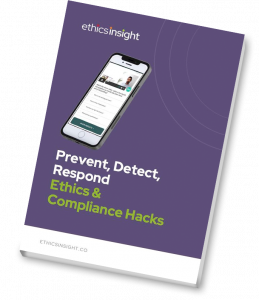
Car Breakdown + Impact Lessons
During a car breakdown priorities become clearer. The experience highlighted how pressure can sharpen decision-making and reveal true priorities, offering an unexpected lesson in risk management.

During a car breakdown priorities become clearer. The experience highlighted how pressure can sharpen decision-making and reveal true priorities, offering an unexpected lesson in risk management.

Shikake is a Japanese concept of using subtle design cues to influence behavior without force. The approach is particularly useful for shaping ethical behavior by leveraging environmental cues, simplifying processes, and making desired actions easy and intuitive.

Army ants sometimes form deadly loops by blindly following pheromone trails, a behavior called “ant mills.” Similarly, businesses risk “sphexishness” by rigidly following rules, like overloading contracts with terms, without considering if they truly mitigate risks. Instead of copying others, organisations should tailor approaches to their capacity, influence, and specific supply chain realities.

Risk assessments are often undermined by biases, which skew judgment and decision-making. These biases can lead to focusing on irrelevant risks, ignoring contradictory evidence, or clinging to outdated frameworks. To improve, we must recognise these biases, challenge assumptions, and gather diverse input for a more accurate understanding of risks.

As a regular reader, you might wonder what I actually do professionally. My work spans three key areas: Prevention (program design, training, and knowledge transfer), Detection (assessments and behavioural analysis), and Response (investigative support and crisis management). If you’re curious to learn more, I’m open to discussing how I might help without any hard sell.

Spanning 25 projects across 67 countries, the year revealed critical lessons about adaptability, ESG practices, and organisational risk management. The key takeaway: continuous learning and specialised expertise are essential for navigating complex business landscapes in 2025.

Examine the challenges of implementing comprehensive supply chain due diligence regulations, using the EU’s Corporate Sustainability Due Diligence Directive as an example. The blog highlights the potential pitfalls of hastily enacted regulations without proper guidance, emphasising the importance of proactive research and targeted due diligence over reliance on extensive supplier questionnaires.

The blog illustrates how excessive transparency and routine behaviors can create vulnerabilities for both CEOs and companies. Instead, focus on identifying potential threats, reducing predictability, and developing robust contingency plans to enhance overall resilience.

The blog argues that while well-intentioned, acronym-driven strategies (DEI to ESG) often fail to account for organizational diversity and can lead to superficial compliance rather than meaningful change. It advocates for a more nuanced, context-specific approach…

The blog provides practical negotiation tactics, originally developed for high-stakes situations, that can be applied to manage challenging interpersonal interactions in both professional and personal contexts.

This short guide will give you some simple and clear steps to help you prevent, detect and respond to ethics & compliance issues.

3058 3 Waterhouse Square, 138-142 Holborn, London, UK, EC1N 2SW
| Cookie | Duration | Description |
|---|---|---|
| cookielawinfo-checkbox-analytics | 11 months | This cookie is set by GDPR Cookie Consent plugin. The cookie is used to store the user consent for the cookies in the category "Analytics". |
| cookielawinfo-checkbox-functional | 11 months | The cookie is set by GDPR cookie consent to record the user consent for the cookies in the category "Functional". |
| cookielawinfo-checkbox-necessary | 11 months | This cookie is set by GDPR Cookie Consent plugin. The cookies is used to store the user consent for the cookies in the category "Necessary". |
| cookielawinfo-checkbox-others | 11 months | This cookie is set by GDPR Cookie Consent plugin. The cookie is used to store the user consent for the cookies in the category "Other. |
| cookielawinfo-checkbox-performance | 11 months | This cookie is set by GDPR Cookie Consent plugin. The cookie is used to store the user consent for the cookies in the category "Performance". |
| viewed_cookie_policy | 11 months | The cookie is set by the GDPR Cookie Consent plugin and is used to store whether or not user has consented to the use of cookies. It does not store any personal data. |